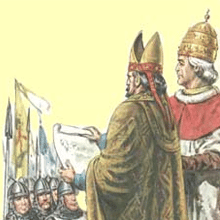VASSAL
Vassal is the one who, in ancient times, was obliged to pay fiefdom . It was the subject of a sovereign or any other type of supreme government , and it was linked to some lord (noble) through a bond of vassalage.

The concept is typical of feudalism , a system of social organization that prevailed in western Europe between the 9th and 15th centuries . This society was based on the cultivation of the land by the serfs or vassals, who had to deliver part of their production to the lord (who, in turn, was loyal to a king).
The vassal was the man who requested protection from a nobleman of superior rank (from the point of view of the social hierarchy) and who swore allegiance to him on his behalf. Both established a vassalage contract that implied mutual obligations.
The lord granted the usufruct of a fief to the vassal, who administered it and took advantage of his income, although without having the property. The lord received part of the agricultural production in exchange.
The formation of a pyramid of vassalage was possible , with various relationships between lords and vassals. At the top was the emperor and below, successively, were kings, dukes or counts, lords of great fiefdoms, etc.
At present, the notion of vassal is used to name the individual who is dependent on another person or who recognizes another subject as superior . For example: "I hate these millionaires who have dozens of vassals around them willing to obey their whims . "
The fall of vassalage
 The feudal pyramid began to dissolve from its peak, when the Carolingian Empire had to face the internal disputes of its heirs throughout 800. At the same time, feudalism began to lose strength, as the vassals enjoyed more rights. Eventually, the lords lost the possibility of untying the vassals from the fiefdoms, since they became hereditary.
The feudal pyramid began to dissolve from its peak, when the Carolingian Empire had to face the internal disputes of its heirs throughout 800. At the same time, feudalism began to lose strength, as the vassals enjoyed more rights. Eventually, the lords lost the possibility of untying the vassals from the fiefdoms, since they became hereditary.
This phenomenon of the fading of the bond between vassals and feudal lords, which originated in the imperial institution, was only legally expressed after several centuries, when the kings were recognized as emperors in their own kingdoms . For this purpose, the legacy of Roman law was of great help, which was rediscovered by glossers, compilers, and lawyers from the Bolognese school. In short, the kings were considered vassals of the pontiff, but they were detached from the feudal relationship with the emperors.
Something similar happened with some of the most important members of the nobility, who became full sovereigns by right ( de jure , as happened with the kingdom of Portugal, which ceased to be a county of León) or in fact ( de facto , like the state of Burgundy or the Catalan counties).
The relations between vassals and lords could be very peculiar: the king of France was lord of the king of England; the King of Poland (with his lands in Prussia), of the Margrave of Brandenburg, who in turn was a vassal of the Roman Emperor Germanic. In many cases, the true power held by each party did not correspond to the position they held in the feudal contract, but was exactly the opposite.
Likewise, excommunication (the power of the Church to permanently or temporarily expel an individual from the confession) provided the possibility of overlooking obligations as a vassal; this made it a powerful resource for the ecclesiastical authorities, which they did not hesitate to use on several occasions.
Finally, it is worth mentioning that in the late Middle Ages the dissolution of the bond between vassals and lords was even more noticeable , especially as a result of the crisis of the 14th century, when there was a marked separation between the high nobles and the impoverished low nobles , in parallel with a strengthening of real power and a political growth of the bourgeoisie in the cities.
Comments
Post a Comment